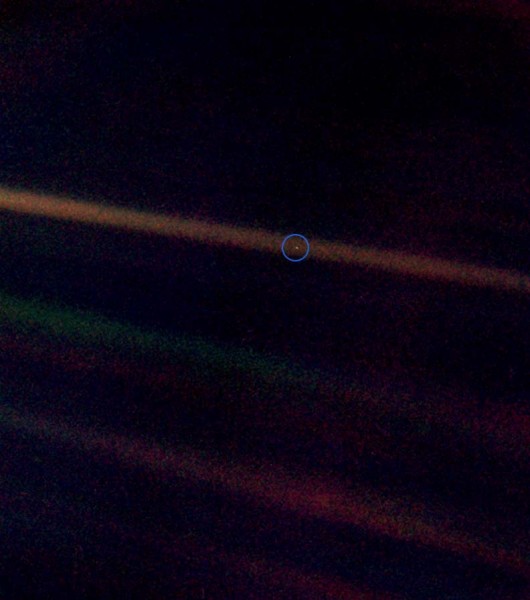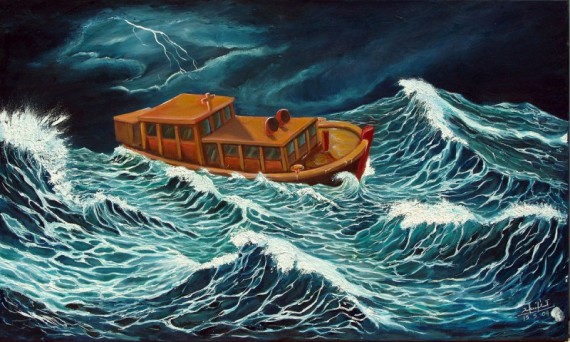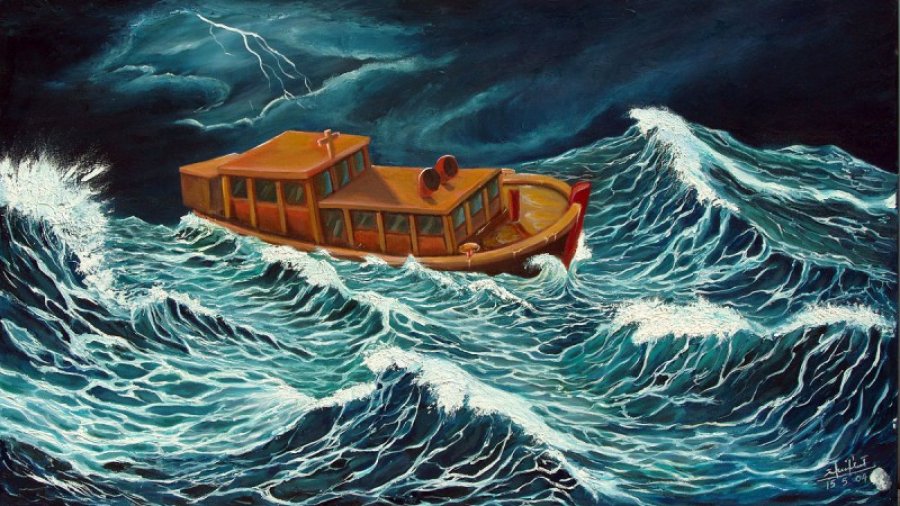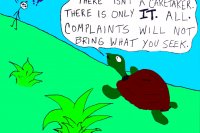Reflections on the “cosmic perspective” and what to remember when feeling powerless to change the world.
I finally started watching the new Cosmos series the other day. You know, the remake of Carl Sagan’s classic 1980s science documentary-show? The one about science and the universe with Neil deGrasse Tyson as intergalactic guide? Yeah, that one.
I’m a little late to the game, I know. The showed aired way back in March, but I don’t watch a whole lot of television. However, as a big fan of Carl Sagan and of the original Cosmos, I was aflutter with science-happy when a friend of mine said he had the series on his computer and we ought to watch it.
We’ve watched the first few episodes the past couple days, and I gotta say—this shit is tremendous. The computer-generated galaxies, pulsars, black holes, supernovas, and Earth-stuffs are stunningly gorgeous. The storytelling and animation used to convey the history of science are delightful. And although deGrasse Tyson cannot and should not attempt to replicate Carl Sagan’s ineffable charm, he nonetheless has an affable gravitas about him which both endears and commands attention. Let’s be honest: he’s kind of a badass.
Cosmic Perspective
While admiring the breathtaking-yet-still-educational awesomeness of Cosmos, I couldn’t help but reflect upon what Carl Sagan called the “cosmic perspective”. Sagan had this idea that our scientific understanding of the unfathomable vastness—like, really, so huge and so old our small brains literally cannot conceive of one drop in the cosmic super-sea—of spacetime could alter our collective consciousness down here on Earth:
“Everyone one of us is, in the cosmic perspective, precious. If a human disagrees with you, let him live. In a hundred billion galaxies, you will not find another.”
Carl Sagan

Photo of Earth from 3.7 billion miles away, taken by NASA Voyager. Photo Credit: Public Domain.
Sagan’s famous ‘Pale Blue Dot‘ commentary was all about seeing Earth from the “cosmic perspective”. Gazing upon the above image, Sagan was inspired to wax lyrical about the folly of human conceit. I’ve included this speech elsewhere on Refine The Mind previously, but I’m including it again because, well, this is one of those timeless jewels of language that everyone in the world should read or listen to monthly:
“From this distant vantage point, the Earth might not seem of any particular interest. But for us, it’s different. Consider again that dot. That’s here. That’s home. That’s us. On it everyone you love, everyone you know, everyone you ever heard of, every human being who ever was, lived out their lives. The aggregate of our joy and suffering, thousands of confident religions, ideologies, and economic doctrines, every hunter and forager, every hero and coward, every creator and destroyer of civilization, every king and peasant, every young couple in love, every mother and father, hopeful child, inventor and explorer, every teacher of morals, every corrupt politician, every “superstar,” every “supreme leader,” every saint and sinner in the history of our species lived there-on a mote of dust suspended in a sunbeam.
The Earth is a very small stage in a vast cosmic arena. Think of the endless cruelties visited by the inhabitants of one corner of this pixel on the scarcely distinguishable inhabitants of some other corner, how frequent their misunderstandings, how eager they are to kill one another, how fervent their hatreds. Think of the rivers of blood spilled by all those generals and emperors so that, in glory and triumph, they could become the momentary masters of a fraction of a dot.
Our posturings, our imagined self-importance, the delusion that we have some privileged position in the Universe, are challenged by this point of pale light. Our planet is a lonely speck in the great enveloping cosmic dark. In our obscurity, in all this vastness, there is no hint that help will come from elsewhere to save us from ourselves.
The Earth is the only world known so far to harbor life. There is nowhere else, at least in the near future, to which our species could migrate. Visit, yes. Settle, not yet. Like it or not, for the moment the Earth is where we make our stand.
It has been said that astronomy is a humbling and character-building experience. There is perhaps no better demonstration of the folly of human conceits than this distant image of our tiny world. To me, it underscores our responsibility to deal more kindly with one another, and to preserve and cherish the pale blue dot, the only home we’ve ever known.”
Look at this picture of the Earth, Carl says. Look at us, friends. We’re a crumb, a speck, a pixel! Every one of us is sitting on that almost-invisible chip of nothing. Hell, everyone you’ve ever known or heard of lived on that chip of nothing—drifting through space, enveloped on all sides by an inestimable black. It’s just us down there. Us. No one is listening to our cries. No one is waiting to save us. We continue to misunderstand, hate, attack, torture, and murder one another in our petty human squabbles. We imagine ourselves to be more important than our neighbors, more important than the Earth. We deceive ourselves. We share this planet; and the Earth, at least for now, is all we have. Cherish the rock! Preserve what lives there! Be decent to one another!
Out of Order
It seems like such a simple message, and while watching Cosmos, mesmerized by the wonders of science, I felt a kind of melancholy longing—a wish that it could really just be so simple. In my imagination, I see all of us on this world suddenly pausing what we’re doing, looking at the stars, pondering the expansive mysteries of the galaxy, and saying, “Wow, I guess we could’ve just chilled out all along. Killing each other for all those years was pretty f***ing stupid. Let’s, like, agree not to do that anymore and work together and shit.”
Terribly idealistic, I know, I know. There are political and economic and geographic and ideological and biological and cultural forces down here on Earth that make it damn hard for the human race to stop perpetually roundhouse kicking itself in the face. But I can dream, I guess. Plenty of us manage it, after all—manage to be basically courteous humans who don’t kill or rape or otherwise maliciously inflict suffering on others. But collectively, we keep failing. Almost 20 years after Carl Sagan’s death, it seems like large segments of the world have yet to glimpse the “cosmic perspective”.

Sailing the Ocean by Latyip. Photo Credit: Wiki Commons.
The Internet is currently flooded with opinions on what’s happening in Ferguson, Missouri in the US, my home country. Yet another black teen has been murdered by a white police officer with little to no explanation, and the event has caused ongoing unrest—protesting, rioting, etc.—in the city of Ferguson. Police have responded aggressively to the protesting, using rubber bullets and tear gas on protestors, and this has catalyzed a national debate on the militarization of police. All in all, the situation is chaotic, saddening, and devoid of easy solutions. Racially motivated shootings (not to mention school shootings and other instances of gun violence) continue to occur with disturbing frequency in the US.
And let’s not forget that swaths of innocent children and civilians continue to be murdered elsewhere in the world—Gaza, Tel Aviv, Baghdad, Libya, Syria, etc. In the past year, numerous political conflicts worldwide have developed or intensified. Meanwhile, economic inequality is growing, education systems are broken, prisons abuse rather than rehabilitate, and the global climate is changing for the worse. It’s 2014, and the world seems pretty messed up. (I’m not usually this depressing, I promise.) If you’re one to meditate on how we could change it all, you might be paralyzed with a sense of powerlessness and hopelessness. There’s so much out of order. How can we begin to try to make it better?
Remembering
This quandary absorbed me during and after watching Cosmos—a sense that our predicament is too large, that I have no hope of making a meaningful difference. Maybe you’ve felt this way too—frustrated, afraid, angry at the problems of the world. It’s easy to slip into this sort of negativity, but it’s hardly productive or healthy. Mostly it convinces us that doom is imminent and that we shouldn’t do anything. After a couple days, I remembered this and a few other important things.
Perhaps the most important thing I remembered (in this situation and others) is that I am just one human with my own issues and shortcomings. It is not within my power to solve all of the world’s problems, and that’s okay. It is a fallacy to impose inadequacy onto natural boundaries that we do not choose for ourselves. I needed to recognize my limitations, but also appreciate what I can and do contribute. I write, teach, create, donate, get better at recycling, try to be kind.
There are numerous ways to help make the world better, numerous routes of activism, to be sure. I remembered that there are countless others like me working in various ways to tackle the world’s problems, that I am not alone. I also happened to read the 2014 Gates Foundation Letter yesterday, and this further demonstrated to me, empirically, that so many people care about bettering the world, and that we have made astonishing strides toward ending global poverty and health crises—the most devastating killers of humanity—in the past 50 years alone. I don’t know if we will ever overcome many of our challenges, but the fact that it is we who are trying—a collective effort—makes me feel less immobilized, motivates me to get up and do something like write this article.
I also remembered that I cannot and should not dedicate every waking moment to thinking about and trying to change the world’s problems. To do so would be foolish, as life hardly seems worth the trouble if we never detach from the endless drama and just enjoy it. I remembered that the human race has always had problems and always will. If we are without problems, we create some; such is the tragicomic nature of our existence, it seems. Who am I to deem this situation “bad” or “shitty” in 2014 when the universe has been unfolding for aeons and will doubtlessly outlive the human race and its finite imagination? Perhaps the universe knows better than my this-or-that labeling.
A deep breath was in order, as well as a pause. I needed to sit down and focus on the basics—the fundamentals of being a not-sinister human. I actually just needed to remember to always start with those sage words of Carl Sagan’s. I needed to remember that if each of us were to take his sentiments to heart, the world would see a remarkable transformation. Considering that truth inspired me to write this, as a reminder to myself and to all of you. As with all of human history, this era has its wonders and its atrocities. This polarity may well be unavoidable, but in an effort to reduce the gunk, let’s try to hold onto the cosmic perspective, to imprint Sagan’s words on our soul-stuff:
“There is perhaps no better demonstration of the folly of human conceits than this distant image of our tiny world. To me, it underscores our responsibility to deal more kindly with one another, and to preserve and cherish the pale blue dot, the only home we’ve ever known.”
If this was cosmic, read the mission and subscribe.
Also, one time I made a rap song about Carl Sagan. Listen if you want:
About Jordan Bates
Jordan Bates is a Lover of God, healer, mentor of leaders, writer, and music maker. The best way to keep up with his work is to join nearly 7,000 people who read his Substack newsletter.





Somehow a couple comments got lost in the shuffle. One from Francis Meyrick: “Bravo. Yup. Carl Sagan’s words are right on the money. Now, quoting you: “Who am I to deem this situation “bad” or “shitty” in 2014 when the universe has been unfolding for aeons and will doubtlessly outlive the human race and its finite imagination? Perhaps the universe knows better than my this-or-that labeling.”- I’m kind of a beaver-beaver, doin g stuff, working or scribbling or doing up rent houses or motorcycling, more beaver-beaver-beaver… and then…. CRASH! Ahhh….. sometimes I need to pause, meditate, and see my smallness.… Read more »
Appreciated as always, Francis.
Another from Tyler Goetzman: “Jordan, I thoroughly enjoyed reading your thoughts on the latest “Cosmos” and feelings towards the “Cosmic Perspective” after watching the reboot. I was anticipating the new “Cosmos” about a year before it launched when he gave wind of it during an interview…I was beyond excited. I was equally excited that Steve Soter and Ann Druyan were once again writing for the new “Cosmos.” I couldn’t agree more with what you said regarding NDT’s role: “although Neil deGrasse Tyson cannot and should not attempt to replicate Carl Sagan’s ineffable charm, he nonetheless has an affable gravitas about… Read more »
Tyler, this was an awesome, in-depth comment. Glad you agreed with so much in this post. Best.
After you’re done considering your smallness, consider too, your hugeness. You have an entire universe locked up in the atoms of your body. On that micro-micro-microscopic level, everything is just as infinite and just as neutral as the outside universe Dr. Sagan speaks of. You are a nexus phenomenon between infinities.
beautifully put, syd. thank you.
Deeply philosophical article!
Each human is an atom (atma) having worlds of power (Shakthi) within him just as there are worlds without!
Lead kindly Light………!
i like that, v. thank you. 🙂
This feeling of helplessness is something I often struggle with. What always calms me and reassures me are Lao Tzu’s words: “All difficult things have their origin in that which is easy, and great things in that which is small. … A journey of a thousand miles must begin with a single step.” If you really consider it, the small things are ALL we can ever really do. Life is just an accumulation of “small things”. They grow into big things. But right now, in this moment, the small things are all we have. Realizing this was a weight off… Read more »
really well put, chase. thanks for the great comment. curious what other things you do to live sustainably apart from recycling? this is something i’m always trying to learn more about and get better at. those words of lao tzu’s are wise indeed. thinking abstractly about all of the world’s problems can be utterly paralyzing and sap our ability to even participate in the world immediately at hand. in those times of analysis paralysis, it’s helpful to remember that perhaps the best thing we could do is just go have a genuine and vulnerable conversation with our friend or neighbor… Read more »
When you think about it, all things follow a scale-able pattern… “Cosmic Stuff” became a Universe of Bacteria, that Bacteria formed it’s own Universe inside of us (all living things actually), and all living things are a Universe in the Universe itself. Same pattern with rocks, Planets, Solar Systems, Universe etc… Same with particles, gasses, Suns / Stars, Universe etc… Tiny, to small, to Large … WITHIN another tiny (on scale), to small, to Large … on and on… The pattern continues. Darwin’s tree of Evolution, an explosion from a firework. It all follows the same general, Cosmic pattern. We… Read more »
Your presence on this pale blue dot makes a difference that cannot and should not ever suffer the scrutiny of quantification. Continue.
[…] Carl Sagan posited that, “We are a way for the cosmos to know itself.” That statement seems to me to contain truth, in the sense that we are an inextricable part of the process of creation and are simultaneously complex sensory apparatuses capable of observing, smelling, tasting, touching, hearing, and thinking about ourselves and the larger world and universe around us. […]